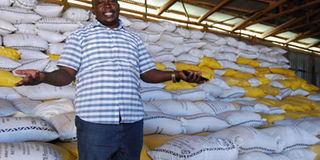Cheap Tanzanian rice leaves 1,000 Busoga farmers stranded

Mr Abdul Karim Kateeba, the chairperson of Namutumba Rice Farmers’ Group, at a store. He says they have failed to sell many tonnes of the product due to the importation of cheap rice from Tanzania. PHOTO | PHILIP WAFULA
What you need to know:
- The development has left thousands of tonnes of rice locked up in warehouses in Jinja City. One of such warehouse is OBN Produce and Supply Company Ltd in Walukuba, Walukuba-Masese Division.
About 1,060 rice growers from Kamuli, Kaliro, Luuka, and Namutumba districts in Busoga sub-region are stranded with tonnes of rice following the importation of cheap rice from Tanzania.
The development has left thousands of tonnes of rice locked up in warehouses in Jinja City. One of such warehouse is OBN Produce and Supply Company Ltd in Walukuba, Walukuba-Masese Division.
Mr Twaha Mugoya, the chairperson of Namutumba Rice Farmers Group, which boasts about 50 rice growers, on Wednesday said the flooding of Tanzanian Kaiso rice into the Ugandan market is pushing them out of business.
He said large-scale commercial rice farmers such as OBN Produce and Supply Company Ltd are only willing to offer them up to Shs1,800 for their rice per kilogramme instead of Shs2,000, but are also willing to pay Shs2,000 for the Tanzanian rice.
“We put in a lot of effort to grow this rice considering that we have been under a lockdown. Rice from Tanzania is in plenty because it comes into the country without taxes,” he said.
The East African Community (EAC) Common Markets protocol allow partner states, including Uganda, Kenya, Tanzania and others, to benefit from free trade barriers, among other rights.
Mr Abdul Karim Kateeba, the coordinator of Bakusekamajja Farmers’ Group in Bugiri District, which links about 162 rice growers to OBN Produce and Supply Company Ltd, said as many as 300 trucks of rice are packed at Mutukula border point awaiting clearance to Uganda.
“In 2017, we heard that OBN Produce and Supply Company Ltd was helping farmers to market our rice; if we aren’t impressed with the market condition, we hoard the rice until we get a better price,” Mr Kateeba said.
Mr Bernard Mugoya Mutebi, the director of OBN Produce and Supply Company Ltd, which trades as Agroben, said there is a lot of tax-free rice imported from Tanzania.
While the rice from Tanzania is credited for having a distinctive aroma, Mr Mutebi said farmers in Busoga don’t know how to grow upland rice compared to, say, people from Gulu and Nwoya in northern Uganda.
In Uganda, there are mainly two types of rice grown; upland rice, which can be farmed even on fairly dry areas, and paddy rice that is specifically grown in swampy areas.
“Busoga Sub-region is good at growing paddy rice, not upland rice and the same applies to the Teso sub-region. I appeal to the government to soften some laws and allow people to start growing rice in swampy areas,” Mr Mutebi said.
He adds that their current market base is mainly Kampala and western Uganda.
“Farmers in western Uganda grow matooke but eat rice and that is where our major market is. We are not exporting because we don’t have the tonnage government expects of us,” he said.




